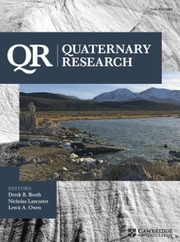Crossref Citations
This article has been cited by the following publications. This list is generated based on data provided by
Crossref.
Muhs, Daniel R.
1984.
INTRINSIC THRESHOLDS IN SOIL SYSTEMS.
Physical Geography,
Vol. 5,
Issue. 2,
p.
99.
Brakenridge, G. Robert
1985.
Discussion of “Gradational Thresholds and Landform Singularity: Significance for Quaternary Studies”.
Quaternary Research,
Vol. 23,
Issue. 3,
p.
417.
Harvey, Michael D.
and
Watson, Chester C.
1986.
FLUVIAL PROCESSES AND MORPHOLOGICAL THRESHOLDS IN INCISED CHANNEL RESTORATION1.
JAWRA Journal of the American Water Resources Association,
Vol. 22,
Issue. 3,
p.
359.
Phillips, Jonathan D.
1986.
Sediment Storage, Sediment Yield, and Time Scales in Landscape Denudation Studies.
Geographical Analysis,
Vol. 18,
Issue. 2,
p.
161.
Waters, Michael R.
1988.
The impact of fluvial processes and landscape evolution on archaeological sites and settlement patterns along the San Xavier reach of the Santa Cruz River, Arizona.
Geoarchaeology,
Vol. 3,
Issue. 3,
p.
205.
Richards, Keith
1990.
Fluvial geomorphology: initial motion of bed material in gravel-bed rivers.
Progress in Physical Geography: Earth and Environment,
Vol. 14,
Issue. 3,
p.
395.
Prosser, Ian P.
1991.
A Comparison of Past and Present Episodes of Gully Erosion at Wangrah Creek, Southern Tablelands, New South Wales.
Australian Geographical Studies,
Vol. 29,
Issue. 1,
p.
139.
Hoey, Trevor B.
and
Sutherland, Alex J.
1991.
Channel morphology and bedload pulses in braided rivers: a laboratory study.
Earth Surface Processes and Landforms,
Vol. 16,
Issue. 5,
p.
447.
Erskine, Wayne D.
1992.
Channel response to large‐scale river training works: hunter river, Australia.
Regulated Rivers: Research & Management,
Vol. 7,
Issue. 3,
p.
261.
Bridge, John S.
1993.
The interaction between channel geometry, water flow, sediment transport and deposition in braided rivers.
Geological Society, London, Special Publications,
Vol. 75,
Issue. 1,
p.
13.
Robertson-Rintoul, M. S. E.
and
Richards, K. S.
1993.
Braided-channel pattern and palaeohydrology using an index of total sinuosity.
Geological Society, London, Special Publications,
Vol. 75,
Issue. 1,
p.
113.
Scott, Pamela F.
and
Erskine, Wayne D.
1994.
Geomorphic effects of a large flood on fluvial fans.
Earth Surface Processes and Landforms,
Vol. 19,
Issue. 2,
p.
95.
Kale, Vishwas S.
Baker, Victor R.
and
Mishra, Sheila
1996.
Multi-channel patterns of bedrock rivers: An example from the central Narmada basin, India.
CATENA,
Vol. 26,
Issue. 1-2,
p.
85.
Benito, Gerardo
1997.
Energy Expenditure and Geomorphic Work of the Cataclysmic Missoula Flooding in the Columbia River GGorge, USA.
Earth Surface Processes and Landforms,
Vol. 22,
Issue. 5,
p.
457.
Huckleberry, Gary A.
and
Billman, Brian R.
1998.
Floodwater Farming, Discontinuous Ephemeral Streams, and Puebloan Abandonment in Southwestern Colorado.
American Antiquity,
Vol. 63,
Issue. 4,
p.
595.
Brierley, Gary J
and
Fryirs, Kirstie
1999.
Tributary–trunk stream relations in a cut-and-fill landscape: a case study from Wolumla catchment, New South Wales, Australia.
Geomorphology,
Vol. 28,
Issue. 1-2,
p.
61.
Phillips, Jonathan D.
2001.
HUMAN IMPACTS ON THE ENVIRONMENT: UNPREDICTABILITY AND THE PRIMACY OF PLACE.
Physical Geography,
Vol. 22,
Issue. 4,
p.
321.
Hsieh, Meng-Long
and
Knuepfer, Peter L.K
2001.
Middle–late Holocene river terraces in the Erhjen River Basin, southwestern Taiwan—implications of river response to climate change and active tectonic uplift.
Geomorphology,
Vol. 38,
Issue. 3-4,
p.
337.
Vale, Thomas R.
2003.
Scales and Explanations, Balances and Histories: Musings of a Physical Geography Teacher.
Physical Geography,
Vol. 24,
Issue. 3,
p.
248.
2004.
Geomorphology and River Management.
p.
364.


